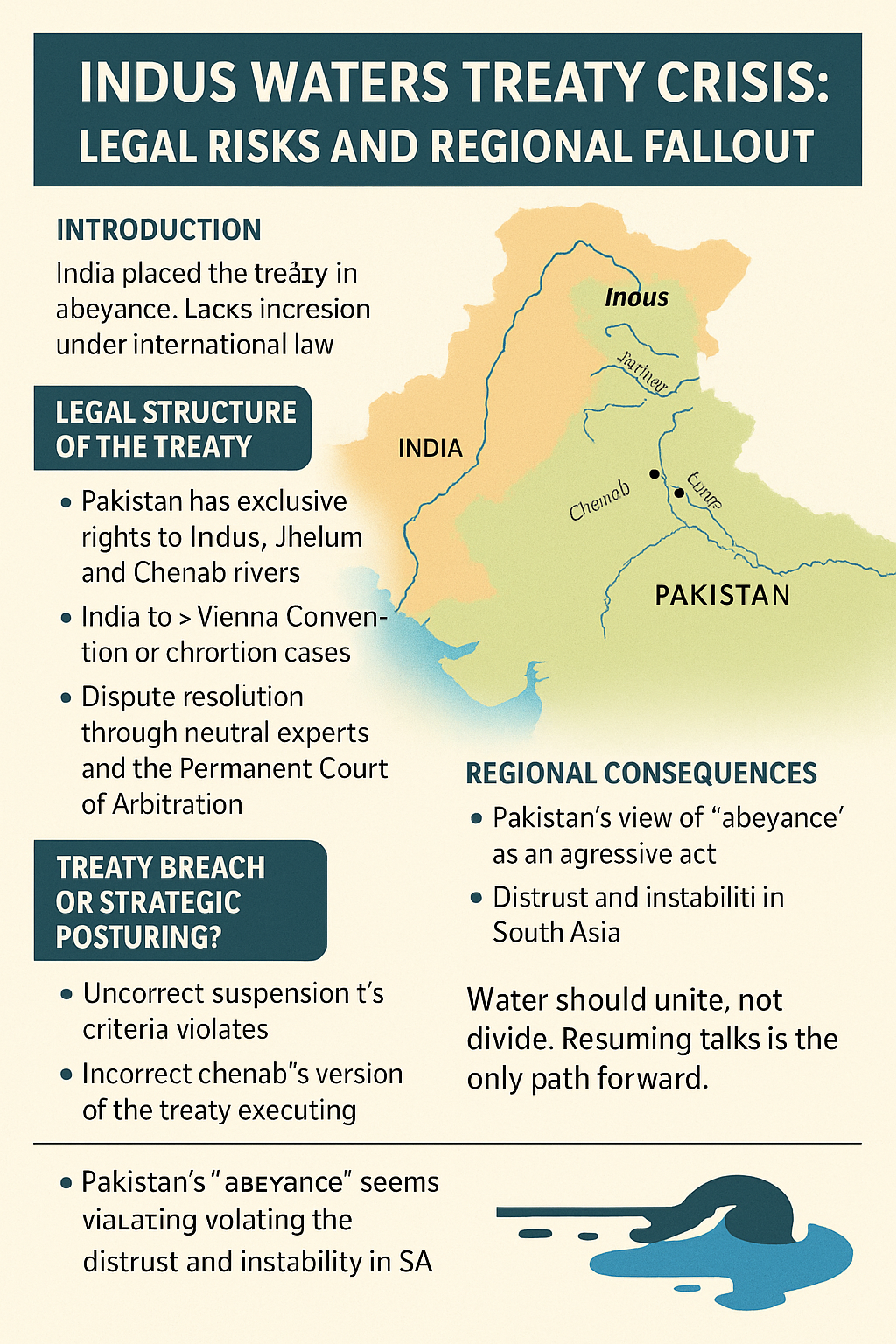Indus Waters Treaty Crisis: Legal Risks and Regional Fallout
India’s suspension of the Indus Waters Treaty raises legal red flags and regional concerns. Explore its implications under international law and treaty obligations.
Indus Waters Treaty Crisis: Legal Risks and Regional Fallout
For over six decades, the Indus Waters Treaty (IWT) has served as a rare example of cooperation between India and Pakistan in a highly strained bilateral relationship. Signed in 1960 and brokered by the World Bank, it distributed control of six rivers: the eastern three (Ravi, Sutlej, and Beas) to India and the western three (Indus, Jhelum, and Chenab) to Pakistan.
But recent developments have cast a long shadow over this landmark water-sharing agreement. In a drastic move, India has placed the treaty “in abeyance”—a diplomatic phrase that has no clear legal standing under international law.
⚖️ The Legal Structure of the Indus Waters Treaty
Under the IWT:
- India has exclusive rights over the eastern rivers.
- Pakistan has unrestricted use of the western rivers, except for limited uses by India (e.g., agriculture, hydropower without storage).
- The treaty outlines specific rules for dispute resolution, including neutral experts and the Permanent Court of Arbitration.
Suspending a treaty is a legally weighty act. According to the Vienna Convention on the Law of Treaties (VCLT)—the global framework for managing treaties—such suspension is only valid under specific conditions: breach by one party, impossibility of performance, or fundamental change of circumstances.
India’s recent declaration does not meet any of these conditions, making the suspension legally questionable under international law.
🚫 Treaty Breach or Strategic Posturing?
The current standoff follows escalating tensions and border-related clashes between the two nations. By suspending the IWT, India has unilaterally acted outside the treaty’s legal boundaries. According to Article III(2) of the IWT, India must not interfere with the unrestricted flow of the western rivers.
Allegations that India diverted or restricted the Chenab’s water flow could amount to a violation of treaty obligations, constituting an internationally wrongful act that demands remedy or compensation.
Such action not only weakens the legal fabric of the IWT but also sets a dangerous precedent for other transboundary water agreements worldwide.
🧑⚖️ What International Law Says
Under international law:
- Unilateral suspension of a bilateral treaty—especially one like the IWT with well-established mechanisms—is not permitted without formal dispute procedures.
- The Vienna Convention (1969) governs such treaties and emphasizes resolving conflicts through peaceful means before suspensions or withdrawals.
If India believes the treaty has been materially breached by Pakistan, it should invoke the dispute resolution provisions within the IWT—not act unilaterally.
This action by India could be challenged in the International Court of Justice or be raised at forums such as the UN General Assembly or International Law Commission.
🌍 Regional Consequences: More Than Just Legal Drama
This is not just a legal matter—it’s a geopolitical flashpoint.
Pakistan sees the Indus as its lifeline. Its agriculture, industry, and food security are intricately tied to the rivers controlled under this treaty. Any disruption, especially of the Chenab or Jhelum, could spark major economic and political unrest.
India’s move, even if temporary or symbolic, fuels distrust and instability in a region already burdened by unresolved disputes and competing nationalisms. It also raises fears of “water weaponization”—where access to water becomes a tool of coercion or retaliation.
💬 Missed Opportunity for Diplomacy
What’s even more troubling is that no formal dispute process was initiated before this suspension. The IWT allows for:
- A neutral expert to resolve technical differences
- The Permanent Court of Arbitration for legal disputes
- World Bank facilitation if bilateral efforts fail
By bypassing these steps, India has not only weakened the treaty’s framework but also delegitimized international mechanisms that have long preserved peace over this crucial shared resource.
🛑 A Dangerous Precedent for Water Wars?
The Indo-Pak water conflict is not isolated. Globally, over 260 rivers are shared across national borders, and many nations rely on international agreements to manage access. If large countries can suspend such treaties without legal backing, it undermines decades of diplomacy and environmental cooperation.
Countries like Egypt (Nile), Turkey (Tigris-Euphrates), and China (Brahmaputra) may start taking cues from this bold maneuver—setting off a chain reaction of treaty breakdowns.
✅ Conclusion: Law Over Power
The Indus Waters Treaty has been hailed as a model for cooperation even in the worst of times. If it fails now due to political maneuvering, it will be a failure of law, diplomacy, and foresight.
Pakistan must push for legal redress through international platforms and engage allies diplomatically to exert pressure for treaty reinstatement. India, on the other hand, should recognize the long-term damage to its regional and global credibility if it continues down this path.
💧 In the 21st century, water should be a bridge, not a battleground. It’s time for both nations to return to the negotiation table—not the brink of conflict.
📚 References & Further Reading
- Indus Waters Treaty – Ministry of External Affairs, India
- Vienna Convention on the Law of Treaties (UN)
- International Law & Indus Wars – Dawn
